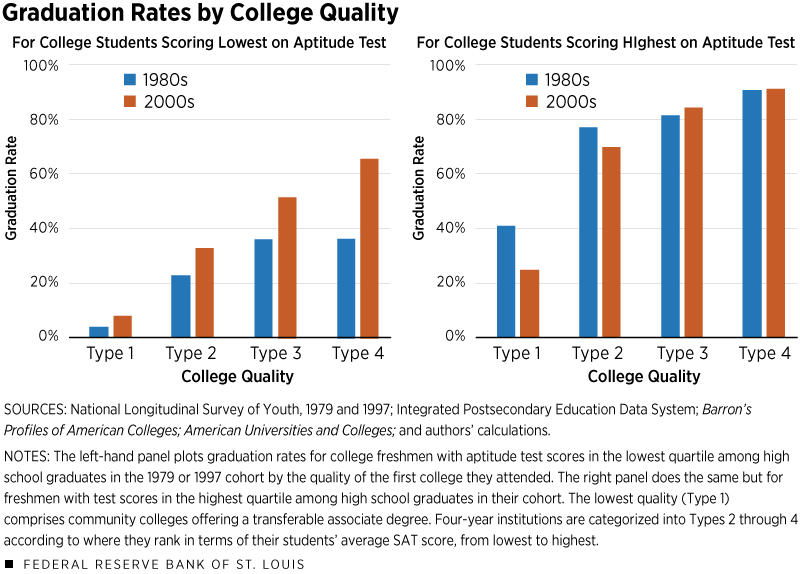How Much Does College Quality Matter?

The following post is the first in a two-part series on what’s behind the rising returns to high-quality college education.
An analysis of students who were in college in the early 1980s and the early 2000s suggests that attending a high-quality college leads to higher graduation rates and income, according to a recent Regional Economist article. Furthermore, these gains from college quality seem to have risen over time.
Senior Economist Oksana Leukhina and Senior Research Associate Joseph McGillicuddy looked at the rising returns to high-quality college education (the subject of the first post in this series) as well as possible explanations for what’s behind these rising returns (the subject of the second post).
Data on Student Outcomes
For their analysis, the authors used data from the 1979 and the 1997 National Longitudinal Surveys of Youth. The 1979 survey follows a group of baby boomers (with many entering college around 1980), while the 1997 survey follows a group of millennials (with many entering college around 2000).
In addition to questions on education and income, the authors noted that these surveys also included an aptitude test for all participants.
College Quality
To categorize colleges and universities, Leukhina and McGillicuddy obtained data on average SAT scores among freshmen. They broke schools into four types:
- Type 1: Community colleges that offer a transferable associate degree
- Type 2: Lowest-ranked four-year institutions, based on freshmen’s average SAT score
- Type 3: Middle-ranked four-year colleges
- Type 4: Highest-ranked four-year colleges
The authors noted that the four-year colleges were split into three groups based on freshmen enrollment in 2000.
Adjusting for Student Composition Effects
The authors cautioned that simply comparing graduation rates and salary differences across colleges could lead to exaggerated estimates of the effect that college quality has on outcomes.
Therefore, they adjusted for student learning ability—“a term that refers collectively to all student characteristics at the time of high school graduation that matter for both their academic success and labor market success (e.g., college preparedness, work ethic, grit, ambition),” they explained.
They used aptitude test score percentiles to approximate student learning ability and compared outcomes across colleges for students with similar test scores.
Effects of College Quality after Such Adjustments
For the older cohort, the authors found that a student’s probability of graduating increased by 50 percentage points on average when he or she chose the highest-quality four-year college path over a community college path to a bachelor’s degree. For the younger cohort, the probability increased by 63 percentage points.
The figure below illustrates the increasing importance of college quality for graduation outcomes.

The panel on the left shows graduation rates by college quality for freshman scoring the lowest on the aptitude test. “The positive relationship between college quality and graduation rates is steeper for the younger cohort—mainly because students with low test scores performed better at higher-quality schools,” Leukhina and McGillicuddy wrote.
Similarly, the panel on the right shows graduation rates by college quality for those scoring the highest on the aptitude test. “Again, the positive relationship between college quality and graduation rates is steeper for the younger of the two cohorts—mainly because high-scoring students performed worse at lower-quality schools,” the authors wrote.
When it comes to post-graduation earnings for the older cohort, the authors found that graduates from the highest-quality four-year colleges earned 5% more per year than those who graduated from the lowest-quality four-year colleges. That number was 10% for the younger cohort.
Summary of Trends over Time
“We found that the importance of college quality as a determinant of graduation rates and post-college earnings increased, while the importance of aptitude test scores declined,” Leukhina and McGillicuddy wrote.
So, what explains the rising importance of college quality? The authors examined this question and argued that increased sorting between students and colleges may help explain the rising gains. This will be the subject of the next post in this series.
Additional Resources
- Regional Economist: What’s behind Rising Returns to High-Quality College Education?
- On the Economy: How Do Students Pay for College?
- On the Economy: Are Students Borrowing Too Much? Or Too Little?
Citation
ldquoHow Much Does College Quality Matter?,rdquo St. Louis Fed On the Economy, Dec. 10, 2019.
This blog offers commentary, analysis and data from our economists and experts. Views expressed are not necessarily those of the St. Louis Fed or Federal Reserve System.
Email Us
All other blog-related questions

